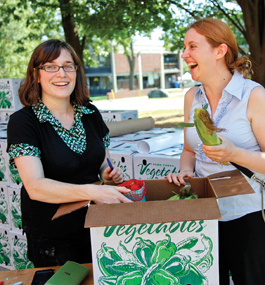From Farm to Plate the CSA Way

Mike Lovett
Left: Sustainability coordinator Janna Cohen-Rosenthal
by SUSAN CHAITYN LEBOVITS
You don’t have to grow your own or hit up a farmer’s market to enjoy produce plucked straight from the vine or dug from the soil. Simply join the burgeoning community supported agriculture (CSA) movement. At Brandeis, that means buying a seasonal membership in Warner Farm, a fruit and vegetable CSA enterprise that delivers a variety of neatly boxed ultrafresh produce to the campus every week throughout the growing season.
Starting in March, Brandeis community members signed up and paid for a small, medium or large share of the Sunderland, Mass., farm’s crops before sprouts even muscled their way to sunlight. A 20-week membership runs from June through October; an 8-week share runs from September through October.
Come summertime, members just show up at Spingold Theater every Tuesday afternoon to pick up their box of produce, which includes veggies like asparagus, pea shoots and greens in the early part of the season and heirloom tomatoes, corn, all kinds of squash, carrots and more as the season goes full tilt. The 150-acre farm produces more than 40 different fruits and vegetables for its members in the rich, alluvial soil of the Connecticut River valley.
The strategy behind the CSA movement is to make local agriculture sustainable by helping farmers finance production and by alleviating cash-flow problems. This support enables farmers to market their produce before the intensive season of field labor begins. The CSA model also spreads risk among members should a crop fail. The advantages for consumers are plentiful: superfresh food, tremendous variety and a collectively smaller carbon footprint because produce is transported locally rather than globally.
The idea for the Brandeis-based CSA partnership was hatched last year when Janna Cohen-Rosenthal, Brandeis’ sustainability coordinator, met an agriculture student who suggested collaborating with Warner Farm. A month later the program was in place and soon after Warner Farm presold about 90 shares, almost double what the CSA needed to make it worthwhile.
“It’s a wonderful thing to have people committed to buying your product,” says Mike Wissemann, Warner Farm’s owner. “Sure, it puts the pressure on us to produce, but that’s OK — growing is certainly challenging, but selling is even more challenging.”
Competing with large-scale growers and supermarkets is one of the most difficult aspects of farming; selling in quantity is cheaper, but such produce often lacks quality. Locally grown produce travels ripe from farm to plate, without being picked prematurely to ripen in transit. The cost of a share is often less expensive than buying fresh fruits and vegetables of equal quality in a supermarket.
“What upsets me is that stores don’t have to tell you how far your produce has traveled from where it was grown,” says Sabine von Mering, associate professor of German and of women’s and gender studies, director of the Center for German and European Studies, and a member of the campus sustainability movement.
“Think about it: You buy organic apples from New Zealand supposedly to avoid chemicals in your food, and in order to get them here they burn tons of jet fuel into the atmosphere. I love the idea that my produce is grown in Massachusetts by people who care about sustainable agriculture,” says von Mering. To find a CSA in your community, visit www.localharvest.org/csa/.
